考研英语易混淆词汇
考研英语30个容易被误解的短语
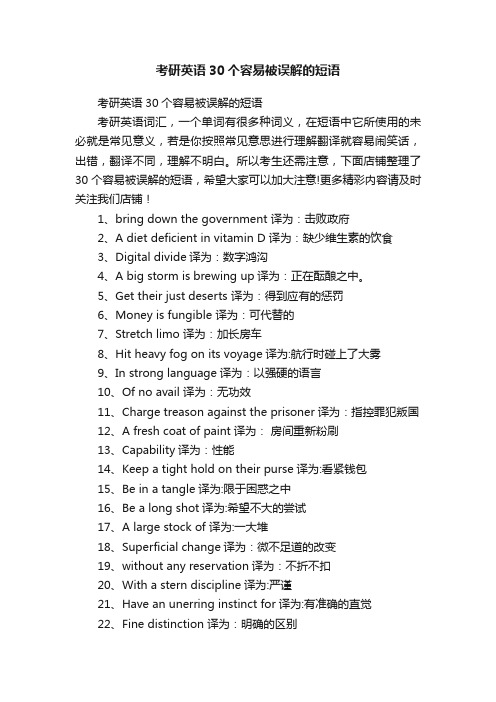
考研英语30个容易被误解的短语考研英语30个容易被误解的短语考研英语词汇,一个单词有很多种词义,在短语中它所使用的未必就是常见意义,若是你按照常见意思进行理解翻译就容易闹笑话,出错,翻译不同,理解不明白。
所以考生还需注意,下面店铺整理了30个容易被误解的短语,希望大家可以加大注意!更多精彩内容请及时关注我们店铺!1、bring down the government 译为:击败政府2、A diet deficient in vitamin D 译为:缺少维生素的饮食3、Digital divide译为:数字鸿沟4、A big storm is brewing up译为:正在酝酿之中。
5、Get their just deserts 译为:得到应有的惩罚6、Money is fungible 译为:可代替的7、Stretch limo 译为:加长房车8、Hit heavy fog on its voyage译为:航行时碰上了大雾9、In strong language译为:以强硬的语言10、Of no avail 译为:无功效11、Charge treason against the prisoner译为:指控罪犯叛国12、A fresh coat of paint译为:房间重新粉刷13、Capability译为:性能14、Keep a tight hold on their purse译为:看紧钱包15、Be in a tangle译为:限于困惑之中16、Be a long shot译为:希望不大的尝试17、A large stock of 译为:一大堆18、Superficial change译为:微不足道的改变19、without any reservation译为:不折不扣20、With a stern discipline译为:严谨21、Have an unerring instinct for译为:有准确的直觉22、Fine distinction 译为:明确的区别23、Make a spectacle of oneself译为:大出洋相24、Live on easy street 译为: 过着优裕的生活25、Holiday shopping译为:假日购物26、Principal breadwinner for their family译为:家庭的顶梁柱27、As witnesses to evil in the past译为:作为过去罪恶的见证人28、Contributing influence译为:影响因素29、Voice their concerns译为:表示对于。
容易混淆的英语单词
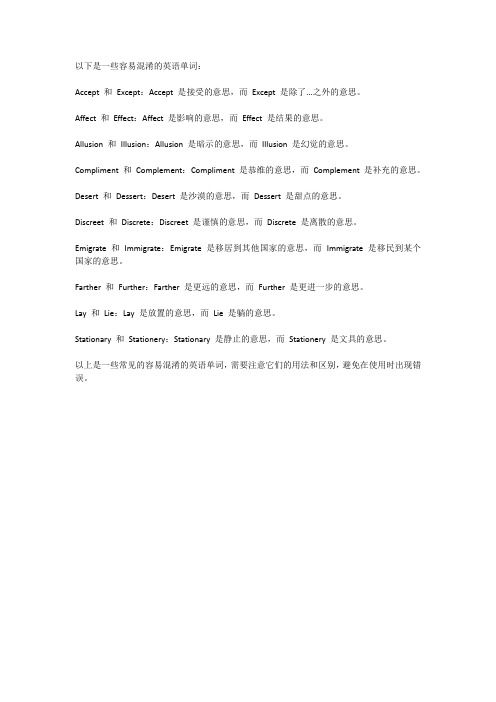
以下是一些容易混淆的英语单词:
Accept 和Except:Accept 是接受的意思,而Except 是除了...之外的意思。
Affect 和Effect:Affect 是影响的意思,而Effect 是结果的意思。
Allusion 和Illusion:Allusion 是暗示的意思,而Illusion 是幻觉的意思。
Compliment 和Complement:Compliment 是恭维的意思,而Complement 是补充的意思。
Desert 和Dessert:Desert 是沙漠的意思,而Dessert 是甜点的意思。
Discreet 和Discrete:Discreet 是谨慎的意思,而Discrete 是离散的意思。
Emigrate 和Immigrate:Emigrate 是移居到其他国家的意思,而Immigrate 是移民到某个国家的意思。
Farther 和Further:Farther 是更远的意思,而Further 是更进一步的意思。
Lay 和Lie:Lay 是放置的意思,而Lie 是躺的意思。
Stationary 和Stationery:Stationary 是静止的意思,而Stationery 是文具的意思。
以上是一些常见的容易混淆的英语单词,需要注意它们的用法和区别,避免在使用时出现错误。
专四词汇语法易错
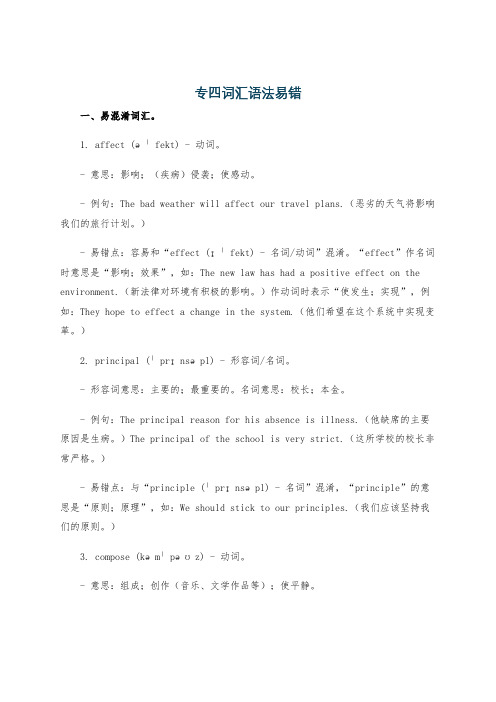
专四词汇语法易错一、易混淆词汇。
1. affect (əˈfekt) - 动词。
- 意思:影响;(疾病)侵袭;使感动。
- 例句:The bad weather will affect our travel plans.(恶劣的天气将影响我们的旅行计划。
)- 易错点:容易和“effect (ɪˈfekt) - 名词/动词”混淆。
“effect”作名词时意思是“影响;效果”,如:The new law has had a positive effect on the environment.(新法律对环境有积极的影响。
)作动词时表示“使发生;实现”,例如:They hope to effect a change in the system.(他们希望在这个系统中实现变革。
)2. principal (ˈprɪnsəpl) - 形容词/名词。
- 形容词意思:主要的;最重要的。
名词意思:校长;本金。
- 例句:The principal reason for his absence is illness.(他缺席的主要原因是生病。
)The principal of the school is very strict.(这所学校的校长非常严格。
)- 易错点:与“principle (ˈprɪnsəpl) - 名词”混淆,“principle”的意思是“原则;原理”,如:We should stick to our principles.(我们应该坚持我们的原则。
)3. compose (kəmˈpəʊz) - 动词。
- 意思:组成;创作(音乐、文学作品等);使平静。
- 例句:Water is composed of hydrogen and oxygen.(水由氢和氧组成。
)He can compose beautiful music.(他能创作优美的音乐。
)- 易错点:容易和“comprise (kəmˈpraɪz) - 动词”弄混。
考研易混词汇
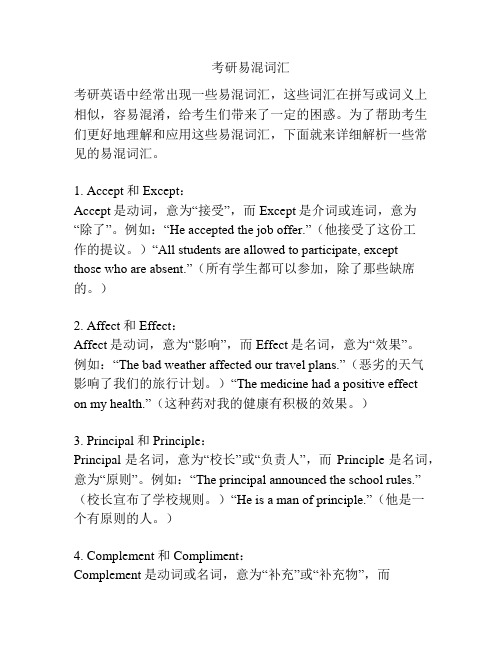
考研易混词汇考研英语中经常出现一些易混词汇,这些词汇在拼写或词义上相似,容易混淆,给考生们带来了一定的困惑。
为了帮助考生们更好地理解和应用这些易混词汇,下面就来详细解析一些常见的易混词汇。
1. Accept和Except:Accept是动词,意为“接受”,而Except是介词或连词,意为“除了”。
例如:“He accepted the job offer.”(他接受了这份工作的提议。
)“All students are allowed to participate, exceptthose who are absent.”(所有学生都可以参加,除了那些缺席的。
)2. Affect和Effect:Affect是动词,意为“影响”,而Effect是名词,意为“效果”。
例如:“The bad weather affected our travel plans.”(恶劣的天气影响了我们的旅行计划。
)“The medicine had a positive effecton my health.”(这种药对我的健康有积极的效果。
)3. Principal和Principle:Principal是名词,意为“校长”或“负责人”,而Principle是名词,意为“原则”。
例如:“The principal announced the school rules.”(校长宣布了学校规则。
)“He is a man of principle.”(他是一个有原则的人。
)4. Complement和Compliment:Complement是动词或名词,意为“补充”或“补充物”,而Compliment是名词或动词,意为“称赞”或“恭维”。
例如:“Her new shoes complement he r outfit.”(她的新鞋与她的装扮相得益彰。
)“He complimented her on her beautiful dress.”(他称赞她漂亮的裙子。
考研的英语易混淆的词汇比较
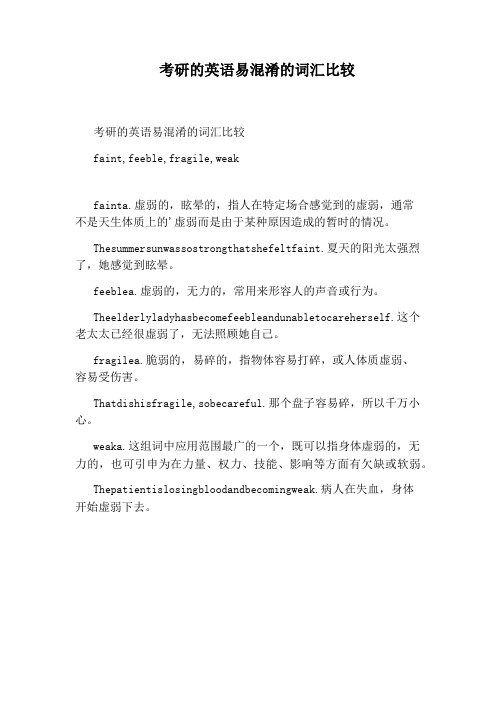
考研的英语易混淆的词汇比较
考研的英语易混淆的词汇比较
faint,feeble,fragile,weak
fainta.虚弱的,眩晕的,指人在特定场合感觉到的虚弱,通常
不是天生体质上的'虚弱而是由于某种原因造成的暂时的情况。
Thesummersunwassostrongthatshefeltfaint.夏天的阳光太强烈了,她感觉到眩晕。
feeblea.虚弱的,无力的,常用来形容人的声音或行为。
Theelderlyladyhasbecomefeebleandunabletocareherself.这个老太太已经很虚弱了,无法照顾她自己。
fragilea.脆弱的,易碎的,指物体容易打碎,或人体质虚弱、
容易受伤害。
Thatdishisfragile,sobecareful.那个盘子容易碎,所以千万小心。
weaka.这组词中应用范围最广的一个,既可以指身体虚弱的,无力的,也可引申为在力量、权力、技能、影响等方面有欠缺或软弱。
Thepatientislosingbloodandbecomingweak.病人在失血,身体
开始虚弱下去。
考研英语易混淆词汇
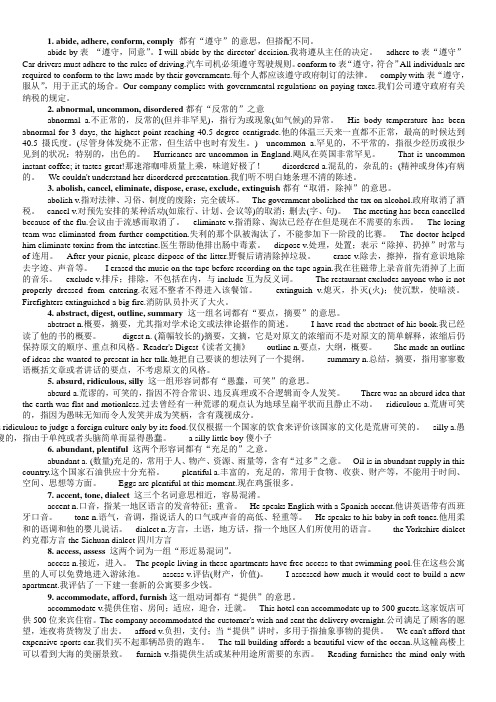
1. abide, adhere, conform, comply 都有“遵守”的意思,但搭配不同。
abide by表“遵守,同意”。
I will abide by the director' decision.我将遵从主任的决定。
adhere to表“遵守”Car drivers must adhere to the rules of driving.汽车司机必须遵守驾驶规则。
conform to表“遵守,符合”All individuals are required to conform to the laws made by their governments.每个人都应该遵守政府制订的法律。
comply with表“遵守,服从”,用于正式的场合。
Our company complies with governmental regulations on paying taxes.我们公司遵守政府有关纳税的规定。
2. abnormal, uncommon, disordered都有“反常的”之意abnormal a.不正常的,反常的(但并非罕见),指行为或现象(如气候)的异常。
His body temperature has been abnormal for 3 days, the highest point reaching 40.5 degree centigrade.他的体温三天来一直都不正常,最高的时候达到40.5摄氏度。
(尽管身体发烧不正常,但生活中也时有发生。
)uncommon a.罕见的,不平常的,指很少经历或很少见到的状况;特别的,出色的。
Hurricanes are uncommon in England.飓风在英国非常罕见。
That is uncommon instant coffee; it tastes great!那速溶咖啡质量上乘,味道好极了!disordered a.混乱的,杂乱的;(精神或身体)有病的。
考研英语复习指导易混淆单词辨析
考研英语复习指导:易混淆单词辨析词汇辨析类试题的天然的模糊性和干扰性是考生的困扰。
即使试题平和,考生也倍感棘手,尤其是在考试环境下,要正常发挥,实属不易。
在考研的完形填空中涉及到大量的词汇辨析,需要考生花大力气攻克。
acute, critical, crucial, urgent这一组形容词都有"严重的,重要的"意思。
acute a。
剧烈的,严重的;急性的(病)。
An acute lack of food brought hunger to the Iraqi people。
食品严重缺乏,伊拉克人民正在忍饥挨饿。
critical a。
意为"关键的",表示处于极度缺乏的状态或事件的转折点,与crucial相似。
与crucial的区别在于它对缺乏的或危急的程度有更准确的衡量;还指"批判性的,分析性的"。
It is critical that you study hard for the exam or you will fail it。
为了考好你必须用功学习,则你会不及格的。
crucial a。
意为"决定性的,紧要关头的,至关重要的",最为笼统,适用于上述两种情况。
Improved consumer confidence is crucial to an economic recovery。
消费者信心的增强对经济的复苏是至关重要的。
urgent a。
意为"紧迫的,急迫的,紧要的",它不强调所指的问题是最重要的,仅强调"紧急的"状态。
We have an urgent need for help; we are running out of water。
我们急需要帮助,我们的水就快要用光了。
adjust, regulate, rectify, amend, convert, alter, modify, transform, vary这九个动词都含有"调整、改变"的意思。
考研英语相似易混单词总结
考研英语相似易混单词总结vt、1、使适应2、改编adept a、(与at, in连用)熟练的;精通的n、内行;老手adjustvt、1、调整,调节2、校正adopt vt、1、收养2、采用,采纳acclaim v、欢呼,喝彩;n、喝彩claim v、1、要求,索赔2、声称,主张3、值得;n、1、权利,要求权,所有权2、 (for, on)索赔3、主张,断言exclaim v、呼喊,惊叫 exclamation n、感叹,惊叹reclaim vt、1、收回2、开垦proclaim vt、宣布,声明declaim v、巧辩, 雄辩; (激昂地)演说; 朗读; 谴责, 以言词攻击declaim against 抗议, 攻击(注:词干claim和clam有“喊叫,说”的意思)applause n、喝彩;夸奖,称赞applaud v、喝彩;称赞plausible a、似乎合情理的,似乎可信的announce v、1、宣布,发表,通告2、报告……到来announcer n、播音员,报幕员denounce vt、公开指责, 公然抨击, 谴责damnv、谴责pronunciation n、发音(方法)pronounce v、1、宣判,宣布2、发音declare vt、1、宣布,宣告2、声明,表明3、断言,宣称declaration n、宣布,宣言appraise v、评价appraisal n、1、评价2、估计,估量praise v、/n、称赞,表扬estimate n、/vt、评估,评价underestimate vt、低估appreciable a、可估计的,可察觉的appreciate vt、感激,欣赏assert vt、1、断言,宣称2、维护insert vt、插入,嵌入exert vt、发挥,施加dessertn、甜食;甜糕点desert vt、1、抛弃2、擅离(职守);n、沙漠,不毛之地abandon vt、1、离弃,抛弃2、放弃discard vt、丢弃,抛弃pretext n、借口,托辞context n、文章前后关系,上下文contest v、比赛,争论;n、竞争,比赛protest v、n、抗议,反对(联想记忆: 凡是应试test我们都是反对的!)detest vt、厌恶, 憎恨 (联想记忆: 凡是应试test我们都是讨厌的!)testimony n、1、证据,证词2、表明testify v、证实,作证verify vi、证实,核实certify v、1、证明2、发证书certificate n、证书,证明书scare vt、惊吓;n、惊恐stare vi、盯,凝视glare v、n、1、闪耀,闪光2、怒视,瞪眼flare n、1、闪耀2、(衣裙等)张开3、(感情的)爆发 v、1、(火焰)闪耀2、(衣裙等)张开flairn、天赋,天资(如:a flair for writing写作的天才)例:If you have a flair for saving, managing and investing money, you have money management skills、如果你有节约、投资、管理钱财的天分,那么你拥有理财的能力。
考研英语单词易混词辨析(2)
31.distinctive 和 distinctdistinctive “有特⾊的”,“独特的”;distinct “清楚的,明显的”; a distinct smell of alcohol on his breath; the distinctive stripes of the zebra.32.dual和dueldual “⼆重的”;dual personality 双重⼈格;dual control 双重管辖;duel “决⽃,竞争”;fight a duel with sb. 与某⼈决⽃;challenge sb. to a duel 向某⼈提出决⽃;a duel of wits ⽃智33.eatable和edibleeatable a. “可⾷⽤的,可吃的”;n. [pl.] “⾷物、⾷品”。
edible a. “适合⾷⽤的,可以吃的”;n. [pl.] “⾷品”。
在指吃的时候⼆者可通⽤:The toast was burnt and barely eatable/edible. 但在其他情况下不⼀样。
If something is eatable, it may be eaten(though it may not be safe or desirable to do so); but, if something is edible it is safe to eat.34.economical和economiceconomic “经济学的,经济上的” an economic survey of Scotland 苏格兰经济调查;an economic blockade 经济封锁;economical “节俭的,经济的”;He’s had to learn to be more economical now that his only income is a small pension.35.evoke和invokeevoke “唤起,引起”;evoke admiration 引起羡慕。
考研英语中常用易混淆词汇
精心整理1. attitude, latitude, altitude, gratitude2.contribute,attribute,distribute 11. exit, exist,12. evaluate, assess, asset, access13. offer, afford14. vital, fatal15. refuse, decline, reject, eject, subject to, object 16.subjective,objective,positive, negative succeed, success 25. golf, gulf 26. appeal, appear 27. count, account 28. term, item29. constant, instant30. unlike, dislike31. personal, personnel32. staff, stuff33. sensitive, sensible;42. negative, positive, active, passive, excessive, progressive, aggressive, exclude, exclusive, explosive, massive 43. coin, coil, soil, oil,44. familiar, similar45. economic, economical46. electric, electrical47. classic, classicalmaintain, retain, obtain, contain, detain57. think, thank58. epoch, era, ear59. release, relieve, believe,relive, deliver60. berry, cherry, merry, Mary, marry, carry61. cost, coast62. border, bother73. bunch, brunch, lunch, launch74. bottom, button75. calculate, speculate, circulate, regulate 76. cabbage, luggage, baggage, garbage77. cable, table, able78. champion, champagne79. labour, labelmodify, notify, clarify, classify89. male, mail90. assemble, resemble, dissemble,91. assure, insure, ensure92. incline, decline93. dissolve, resolve, solve94. suppose, expose, dispose, impose, oppose, compose,103. cancer, cancel104. assign, resign, design 105. minimum, maximum 106. optimistic, pessimistic 107. define, refine, confine 108. relative, relevant 109. restrain, restrict 110. ethnic, esthetic111. blood, flood112. chapter, charter, charthost, hoist122. comprise, compromise 123. conceal, reveal124. confess, profess 125. content, contain126. temporary, contemporary127. since, scene, scenery, sincere128. council, counsel,139. dissolve, resolve, solve 140. dose, doze, dozen 141. dust, dusk142. angle, angel, anchor, ankle 143. edit, credit144. elastic, plastic145. eliminate, illuminate, illustrate146. emit, omitfair, hair, hare, rare, share 155. family, familiar156. feather, feature, figure, finger157. whether, weather,leather158. sweet, sweat 159. fold, folk160.fortnight, forenight 161. form, from172. grap, grip, grasp 173. grand, grant 174. gross, cross 175. glow, grow176. guess, guest 177. hear, heal, heel, hill 178. edge, hedge179. wholly, holy, holly, hoe, hole180. hook, brook, crook190. instruct, construct, 191. interior, exterior, 192. extensive, intensive; 193. internal, external 194. import, export195. include, exclude196. journal, journey197. jump, bump, lump, dump, numb, dumb198. knee, kneel209. log, hog, fog210. lose, loose, loosen 211. manual, annual212. mask, musk213. mass, mess 214. meal, mill215. meat, meet216. medal, meddle, middle 217. mouth, mouse218. nail, snail229. pepper, paper230. phase, phrase231. physics, physicist, physician232. peace, piece233. plane, plain234. policy, police, polish 235. pool, poor236. president, precedent, preceding, previous249. royal, loyal250. low, row251. sale, sail252. send, sand253. sauce, source, sour, sore, shore254. scare, scarce255. scrape, scratch256. cease, seize, size 257. sea, see268. soap, soup269. soul, sole270. space, species271. static, statistic, status, statue272. steak, stick273. still, steel274. stop, stoop275. strap, strip, stripe 276. studio, stadiumundergraduate, postgraduate288. urban, suburb, rural 289. emergent, urgent 290. week, weak 291. mild, wild292. wrist, waist293. approach, reproach 294. path, patch, catch, attach, scratch,305. precise, precious 306. sample, simple307. conviction, convention 308. amaze, amuse309. drift, draft310. stain, strain, drain, refrain311. contact, contract 312. entitle, subtitle313. floor, flaw flow326. comment, command, demand327. nonsense, nuisance 329. constant, consistent 330. potato, tomato。
- 1、下载文档前请自行甄别文档内容的完整性,平台不提供额外的编辑、内容补充、找答案等附加服务。
- 2、"仅部分预览"的文档,不可在线预览部分如存在完整性等问题,可反馈申请退款(可完整预览的文档不适用该条件!)。
- 3、如文档侵犯您的权益,请联系客服反馈,我们会尽快为您处理(人工客服工作时间:9:00-18:30)。
考研英语易混淆词汇比较记忆作者:北京新东方学校考研翻译主讲教师金威abide,adhere,conform,comply这四个研究生入学考试中的高频考词都有“遵守”的意思,但是它们的搭配不同。
abide v.后接by表示“遵守,同意”。
I will abide by the director'decision.我将遵从主任的决定。
adhere v.后接to表示“遵守”。
(当然adhere一词的其它意思如“坚持;粘附”也经常被考到。
)Car drivers must adhere to the rules of driving.汽车司机必须遵守驾驶规则。
conform v.后接to表示“遵守,符合”。
All individuals are required to conform to the laws made by their governments 每个人都应该遵守政府制订的法律。
comply v.后接with表示“遵守,服从”,用于正式的场合。
Our company complies with governmental regulations on paying taxes.我们公司遵守政府有关纳税的规定。
abnormal,uncommon,disordered都有“反常的”之意,在考研和CET-6当中经常让考生们辨析它们的细微差别。
abnormal a.不正常的,反常的(但并非罕见),指行为或现象(如气候)的异常。
His body temperature has been abnormal for3days,the highest point reachin 40.5degree centigrade.他的体温三天来一直都不正常,最高的时候达到40.5摄氏度。
(尽管身体发烧不正常,但生活中也时有发生。
)uncommon a.罕见的,不平常的,指很少经历或很少见到的状况;特别的,出色的。
Hurricanes are uncommon in England.飓风在英国非常罕见。
That is uncommon instant coffee;it tastes great!那速溶咖啡质量上乘,味道好极了!disordered a.混乱的,杂乱的;(精神或身体)有病的。
We couldn't understand her disordered presentation.我们听不明白她条理不清的陈述。
abolish,cancel,eliminate,dispose,erase,exclude,extinguish这一组词都有“取消,除掉”的意思。
abolish v.指对法律、习俗、制度的废除;完全破坏。
The government abolished the tax on alcohol.政府取消了酒税。
cancel v.对预先安排的某种活动(如旅行、计划、会议等)的取消;删去(字、句)。
The meeting has been cancelled because of the flu.会议由于流感而取消了。
eliminate v.指消除、淘汰已经存在但是现在不需要的东西。
The losing team was eliminated from further competition.失利的那个队被淘汰了,不能参加下一阶段的比赛。
The doctor helped him eliminate toxins from the intestine.医生帮助他排出肠中毒素。
dispose v.处理,处置;表示“除掉、扔掉”时常与of连用。
(这一点需要注意。
)exclude v.排斥;排除,不包括在内,与include互为反义词。
The restaurant excludes anyone who is not properly dressed from entering.衣冠不整者不得进入该餐馆。
extinguish v.熄灭,扑灭(火);使沉默,使暗淡。
Firefighters extinguished a big fire.消防队员扑灭了大火。
abstract,digest,outline,summary这一组名词都有“要点,摘要”的意思。
abstract n.概要,摘要,尤其指对学术论文或法律论据作的简述。
I have read the abstract of his book.我已经读了他的书的概要。
digest n.(篇幅较长的)摘要,文摘,它是对原文的浓缩而不是对原文的简单解释,浓缩后仍保持原文的顺序、重点和风格。
Reader's Digest《读者文摘》outline n.要点,大纲,概要。
She made an outline of ideas she wanted to present in her talk.她把自己要谈的想法列了一个提纲。
summary n.总结,摘要,指用寥寥数语概括文章或者讲话的要点,不考虑原文的风格absurd,ridiculous,silly这一组形容词都有“愚蠢,可笑”的意思。
absurd a.荒谬的,可笑的,指因不符合常识、违反真理或不合逻辑而令人发笑。
There was an absurd idea that the earth was flat and motionless.过去曾经有一种荒谬的观点认为地球呈扁平状而且静止不动。
ridiculous a.荒唐可笑的,指因为愚昧无知而令人发笑并成为笑柄,含有蔑视成分。
It is ridiculous to judge a foreign culture only by its food.仅仅根据一个国家的饮食来评价该国家的文化是荒唐可笑的。
silly a.愚蠢的,傻的,指由于单纯或者头脑简单而显得愚蠢。
a silly little bo 傻小子abundant,plentiful这两个形容词都有“充足的”之意。
abundant a.(数量)充足的,常用于人、物产、资源、雨量等,含有“过多”之意。
Oil is in abundant supply in this country.这个国家石油供应十分充裕。
plentiful a.丰富的,充足的,常用于食物、收获、财产等,不能用于时间、空间、思想等方面。
Eggs are plentiful at this moment.现在鸡蛋很多。
accent,tone,dialect这三个名词意思相近,容易混淆。
accent n.口音,指某一地区语言的发音特征;重音。
He speaks English with a Spanish accent.他讲英语带有西班牙口音。
tone n.语气,音调,指说话人的口气或声音的高低、轻重等。
He speaks to his baby in soft tones.他用柔和的语调和他的婴儿说话。
dialect n.方言,土语,地方话,指一个地区人们所使用的语言。
the Yorkshire dialect约克郡方言the Sichuan dialect四川方言access,assess这两个词为一组“形近易混词”。
access n.接近,进入。
The people living in these apartments have free access to that swimming pool 住在这些公寓里的人可以免费地进入游泳池。
accommodate v.提供住宿、房间;适应,迎合,迁就。
This hotel can accommodate up to500guests.这家饭店可供500位来宾住宿。
The company accommodated the customer's wish and sent the delivery overnigh 公司满足了顾客的愿望,连夜将货物发了出去。
afford v.负担,支付;当“提供”讲时,多用于指抽象事物的提供。
We can't afford that expensive sports car.我们买不起那辆昂贵的跑车。
The tall building affords a beautiful view of the ocean.从这幢高楼上可以看到大海的美丽景致。
furnish v.指提供生活或某种用途所需要的东西。
Reading furnishes the mind only with materials of knowledge,it is thinking tha makes what we read ours.阅读虽然为我们的思想提供了各种知识,然而只有思考才能将我们读到的内容变成自己的东西。
accomplishment,attainment,achievement这三个名词都有“成就”的意思。
accomplishment n.成功,成就;才艺,修养。
Climbing that high mountain was an accomplishment for the hikers.对于登山运动员来说,爬上了那座山就是成功。
Being able to paint well is just one of he accomplishments.画画得好只是她的许多才能之一。
attainment n.指学识和造诣(常用作复数);达到,到达。
a scholar of the highest attainments造诣极高的学者achievement n.可指抽象的“成就”,或具体的“成绩”,与accomplishment是同义词accuse,charge两个动词都有“控诉,指控”之意,但它们后面所搭配的介词不同。
accuse v.指控,控诉,与介词of连用。
The police accused him of theft.警察指控他犯有盗窃罪。
charge v.可以指因为小错而受的责备,也指因违法而受到控告,与介词with连用。
The police charged him with murder.警察指控他犯了谋杀罪。
acquire,attain,obtain,gain,earn,achieve,secure都有"获得,取得"在研当中屡次出现它们之间的辨析。
acquire v.多指经过努力逐步获得才能,知识,习惯等,也可用于对财物等的获得,该词强调"一经获得就会长期持有"的含义It is through learning that the individual acquires many habitual ways o reacting to situations.正是通过学习,个人才得以获得应付各种情况的习惯做法。
